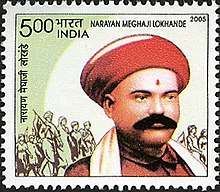Narayan Meghaji Lokhande
Narayan Meghaji Lokhande (1848–1897) was a pioneer of the labour movement in India. He is remembered not only for ameliorating the working conditions of textile mill-hands in the 19th century but also for his courageous initiatives on caste and communal issues.[1] The Government of India issued a postage stamp with his photograph in 2005
Narayan Meghaji Lokhande | |
|---|---|
 Lokhande on a 2005 stamp of Maharashtra | |
| Born | 1848 Thane, Maharashtra, India |
| Died | 9 February 1897 Mumbai, India |
| Movement | Trade Union Movement in India |
Social contribution
Narayan Meghaji Lokhande was a prominent colleague of Mahatma Jotirao Phule. Lokhande is acclaimed as the Father of the Trade Union Movement in India. From 1880 onwards he took over the management of Deenbandhu which was published from Bombay. Along with Lokhande, Phule also addressed the meetings of the textile workers in Bombay. It is significant that before Phule and his colleagues Krishnarao Bhalekar and Lokhande tried to organise the peasants and the workers, no such attempt was made by any organisation to redress their grievances.[2] Lokhande started the first labour association in India — 'Bombay Mill Hands Association'.[3]
Some of the rights mill workers got because of N M Lokhande were:[4]
- Mill workers should get a weekly holiday on Sunday.
- In the afternoon, workers should be entitled to half-hour recess.
- The mill should start working from 6:30 in the morning and close by sunset.
- The salaries of the workers should be given by the 15th of every month.
He was awarded the title of Rao Bahudur by the British Raj. He established 'Mumbai Kamgar Sangh'.
References
- Pandit, Nalini (1997). "Narayan Meghaji Lokhande: The Father of Trade Union Movement in India". Economic and Political Weekly. 32 (7): 327–329. JSTOR 4405089.. Apart from this he was also awarded the title of Rao Bahadur in 1895 for his work during riots between Hindus and Muslims. "Justice of peace" was awarded with great respect to him by the then British Indian Government.
- "Mahatma Jotirao Govindrao Pule". Bahujan Samaj Party India.
- Reddy, R.Jayaprakash (2004). Labour Legislation. New Delhi: APH Publishing Corporation. p. 34. ISBN 8176486264.
- Sarkar, Aditya (2018). Trouble at the Mill: Factory Law and the Emergence of the Labour Question in Late Nineteenth-Century Bombay. New Delhi: Oxford University Press. ISBN 0199093296.